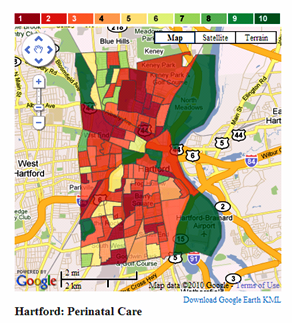Is there a connection between your health and where you live? This link between community and health, and the inequity that can result, is not always intuitive, but the Connecticut Association of the Directors of Health (CADH), a membership organization of Connecticut’s 75 local health departments, is working to change that. The Health Equity Index seeks to make that link not only intuitive, but visible and useful. And with a more visible link, local health departments working in partnership with policy-makers, municipal departments, and the residents they serve can start to examine the underlying causes of health inequities. (Currently, the Index is being made available only to select audiences.)
This link between community and health, and the inequity that can result, is not always intuitive, but the Connecticut Association of the Directors of Health (CADH), a membership organization of Connecticut’s 75 local health departments, is working to change that. The Health Equity Index seeks to make that link not only intuitive, but visible and useful. And with a more visible link, local health departments working in partnership with policy-makers, municipal departments, and the residents they serve can start to examine the underlying causes of health inequities. (Currently, the Index is being made available only to select audiences.)
The Index is a web-based tool that measures community conditions and their correlations with health outcomes, by neighborhood, in Connecticut. Interactive maps illustrate individual neighborhood scores (which range from one to ten, with ten being the best possible score).
The Index has received national attention, including when towns involved in the initial pilot were invited to present to the National Association of County and City Health Officials (NACCHO) held in Hartford this past summer.
I first saw the Index in spring of this year. Because I had lived in New Haven for several years, I was quickly drawn into understanding, for example, the correlation between environmental quality and respiratory illness. So I was excited for the chance to talk to Jennifer Kertanis, Executive Director of the CADH.
Jenn: CT Health was an early investor in the Index. What’s the latest update on the project?
Jennifer: We’re in the process of wrapping up the demonstration phase where local health departments in three cities – Groton, Hartford, and New Haven—used the Index to work with community residents and municipal officials to explore the relationships between neighborhood conditions and health.
We’ve also expanded the project to include the departments from seven additional towns that are using it to support strategic planning and community-needs assessments.
Jenn: The purpose of the Index is twofold: provide a tool for selected communities to identify social inequities that can lead to health inequities, and to create actionable solutions. What are the challenges – and successes – when translating data into a community agenda?
Jennifer: What we’re most excited about was having the communities more readily understand the link between their living conditions, the safety of their neighborhoods, the quality of their schools, job opportunities, and health. The result is that the conversation in public health is changing. Public health departments often focus on health education, which is fine, but the impact of health education, focused on individual behavior, is limited. Instead, the Index has public health departments thinking about how to use the data to engage with non-traditional partners like their colleagues in housing, education, and even the economic department to change policies and practices that have the potential to impact entire populations.
Jenn: Tell me about the three initial pilot sites. Why these three sites? What did you learn from this pilot?
Jennifer: We conducted a request for proposal process, and then selected based on readiness and capacity. The pilot kicked off in May 2009. So far, each department has approached the work differently, based on the nuances of their departments and communities.
For example, the New Haven pilot worked with law enforcement to do a briefing on the impacts of violence on public health. In Groton, the Ledge Light Health District is hosting focus groups to get community input into the Index findings – they hosted a series of conversations based on an art exhibit called “Airing Out Our Dirty Laundry.” In Hartford, the Index is being used to introduce the concept of health disparities.
Each of the sites successfully engaged municipal leaders and department colleagues. The Index serves as a bridge that connects the work of individual departments to the overall health of a community.
Fonte: Connecticut Health Foundation
Indicação do Colunista João Fhilype Santos
